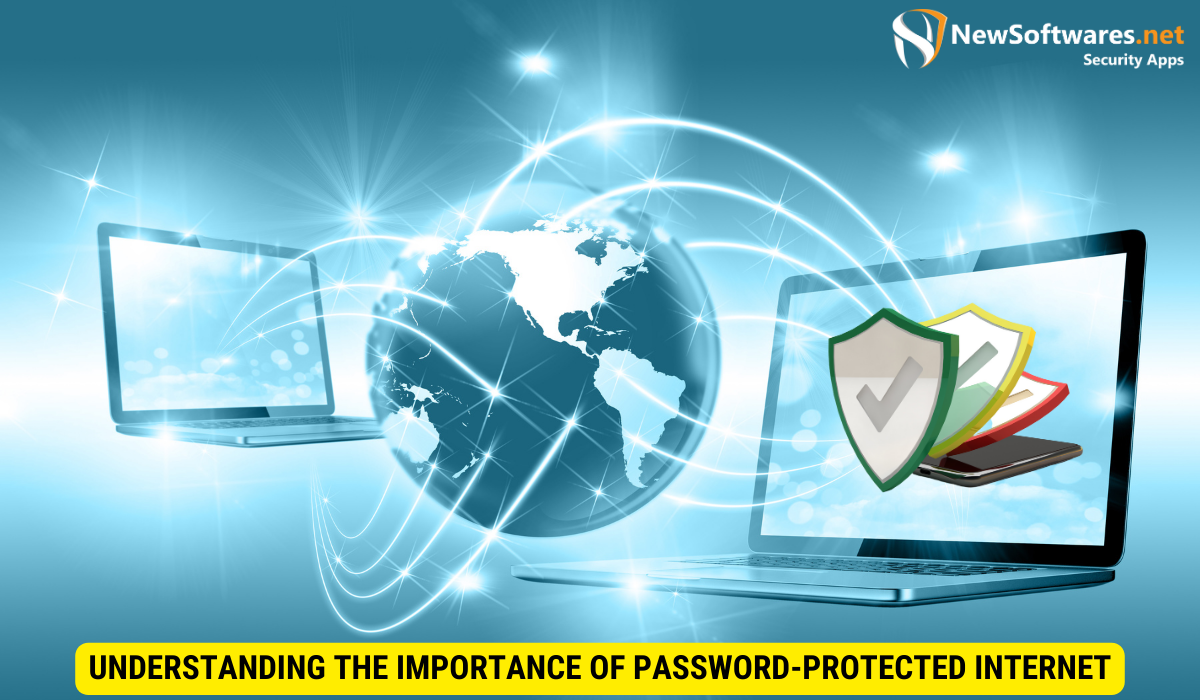To password-protect your internet, access your router’s settings by entering its IP address in a web browser, navigate to the Wi-Fi security settings, select a strong encryption method like WPA2 or WPA3, and set a strong, unique password. Save the settings to ensure your network is secure.
In today’s digital age, where we rely heavily on the internet for various activities, it is crucial to ensure that your internet connection is password-protected. Password protecting your internet is an essential step towards safeguarding your personal information, sensitive data, and maintaining your online privacy. Together, we will explore the importance of password-protected internet, the basics of internet password protection, and provide you with a step-by-step guide on how to password-protect your internet.
Understanding the Importance of Password-Protected Internet

Before we delve into the nitty-gritty of password protection, let’s first understand why it is vital to secure your internet connection. The risks of having an unprotected internet are plentiful, while the benefits of password protection are invaluable.
The Risks of Unprotected Internet
An unprotected internet connection leaves you vulnerable to various cyber threats and risks. Hackers can easily gain unauthorized access to your network, intercept your sensitive information, and potentially use it for malicious purposes. They can also launch cyber attacks, such as Distributed Denial of Service (DDoS) attacks, which can disrupt your internet service or even compromise your devices.
Imagine a scenario where you are browsing the internet, unaware that your connection is unprotected. Suddenly, your personal information, including your credit card details, social media logins, and private messages, are intercepted by a cybercriminal lurking in the shadows. This individual can exploit your data, leading to identity theft, financial loss, and a profound invasion of your privacy.
Moreover, without password protection, anyone within range of your Wi-Fi signal can connect to your network, leading to a slower internet connection and potential data usage issues. This, in turn, may result in slower browsing speeds and higher costs for your internet service. Picture this: you are trying to stream your favorite TV show, but the constant buffering and lag ruin the experience. Unbeknownst to you, your neighbors are piggybacking on your Wi-Fi, hogging your bandwidth and causing frustration.
The Benefits of Password Protection
Password protecting your internet connection comes with a multitude of benefits that cannot be overlooked. The foremost advantage is enhanced security. By setting up a password, you create a barrier that prevents unauthorized users from accessing your network and stealing your data.
Imagine a fortified castle, surrounded by a moat and guarded by vigilant knights. Your password acts as the drawbridge, allowing only those with the correct credentials to enter your digital fortress. With this protection in place, you can browse the internet with peace of mind, knowing that your personal information is shielded from prying eyes.
In addition to security, password protection provides you with the ability to control who can access your internet connection. This is especially important if you live in a densely populated area where neighboring Wi-Fi networks can interfere with your connection. By adding a password, you can ensure that only trusted individuals have access to your network, resulting in improved internet performance and reduced interference.
Imagine a crowded coffee shop, bustling with people and their devices. Without a password on your Wi-Fi, your connection becomes a free-for-all, with everyone vying for bandwidth. However, by setting a password, you can create a VIP section for yourself and your trusted companions, ensuring a seamless browsing experience amidst the chaos.
In conclusion, password protecting your internet connection is not just a recommended practice; it is a necessity in today’s digital landscape. By understanding the risks of an unprotected internet and embracing the benefits of password protection, you can safeguard your online presence and enjoy a secure and uninterrupted browsing experience.
Basics of Internet Password Protection
Now that we understand the importance of password-protected internet, let’s explore the basics of internet password protection.
Ensuring the security of your internet connection is crucial in today’s digital age. By implementing strong password protection measures, you can safeguard your personal information and prevent unauthorized access to your network.
What is a Network Security Key?
A network security key, also known as a Wi-Fi password or passphrase, is a combination of characters that grants access to your wireless network. When you connect a device to your Wi-Fi, you are prompted to enter this key to establish a secure connection. It acts as a virtual lock, preventing unauthorized users from connecting to your network.
It is essential to choose a strong and unique network security key to enhance the security of your Wi-Fi network. A strong key should consist of a combination of letters (both uppercase and lowercase), numbers, and special characters. Avoid using easily guessable phrases or common words as your network security key.
Different Types of Network Security
There are various types of network security protocols available for password protecting your internet. The most common ones include:
- WEP (Wired Equivalent Privacy): Considered the least secure option.
- WPA (Wi-Fi Protected Access): Provides improved security compared to WEP.
- WPA2 (Wi-Fi Protected Access 2): Currently the most secure and recommended option.
- WPA3 (Wi-Fi Protected Access 3): The latest and most advanced protocol available, offering enhanced security features.
When selecting a network security protocol, it is crucial to opt for the most advanced option supported by your devices and router. Upgrading to the latest protocol, such as WPA3, can provide additional layers of security and encryption, making it harder for cyber attackers to compromise your network.
Step-by-Step Guide to Password-Protect Your Internet
Now that you have a solid understanding of the basics, let’s walk through a step-by-step guide on how to password-protect your internet.
Accessing Your Router Settings
The first step is to access your router settings. This can typically be done by opening a web browser and entering your router’s IP address in the address bar. Once you have logged in to your router’s administrative interface, you can proceed to the next step.
Setting Up a Strong Password
Next, navigate to the Wi-Fi settings section within your router’s interface. Here, you can set up a strong password for your internet connection. Ensure that your password is at least 12 characters long, includes a combination of uppercase and lowercase letters, numbers, and special characters. Avoid using easily guessable passwords, such as birthdays or common words.
Maintaining Your Internet Security
Once you have successfully password-protected your internet, it is important to be proactive in maintaining your internet security.
Regularly Updating Your Password
It is recommended to update your Wi-Fi password periodically, especially if you suspect that it may have been compromised. Regularly changing your password can help mitigate the risk of unauthorized access.
What to Do If Your Internet Security is Compromised
If you suspect that your internet security has been compromised, take immediate action. Change your Wi-Fi password, run antivirus scans on your devices, and consider contacting your internet service provider for further assistance and guidance.
Advanced Internet Protection Techniques

In addition to password protection, there are advanced techniques that you can implement to enhance your internet security.
Using a Virtual Private Network (VPN)
A Virtual Private Network, or VPN, encrypts your internet traffic and routes it through a secure server, making it difficult for hackers or anyone else to intercept your data. Using a VPN adds an extra layer of security, especially when accessing the internet from public Wi-Fi networks.
Enabling Firewall Protection
Firewalls act as a barrier between your devices and potential threats from the internet. Enabling firewall protection on your devices can help block unauthorized incoming connections and prevent malware from infiltrating your system.
By implementing these advanced techniques, you can significantly enhance your internet security and protect your personal information and data.
Key Takeaways
In summary, password-protecting your internet is essential for safeguarding your personal information, sensitive data, and online privacy. Here are the key takeaways from this article:
- Unprotected internet connections leave you vulnerable to cyber threats and unauthorized access to your network.
- Password protection provides enhanced security and control over who can access your internet.
- Network security keys are used to establish a secure connection and prevent unauthorized access.
- There are various types of network security protocols available, with WPA2 being the most secure option.
- To password-protect your internet, access your router settings and set up a strong password.
FAQs
1. Can I use the same password for my Wi-Fi network and other accounts?
It is not recommended to use the same password for your Wi-Fi network and other accounts. It is best to have unique and strong passwords for each account to enhance security.
2. Is it necessary to change my Wi-Fi password regularly?
Regularly changing your Wi-Fi password is a good security practice, especially if you suspect it may have been compromised.
3. Can I password-protect my internet on my mobile devices?
Yes, you can password-protect your internet on mobile devices by setting up a Wi-Fi password on your router.
4. Do all routers have the same process for password protection?
No, the process for password protection may vary slightly depending on the brand and model of your router. However, the general steps outlined in this article should apply to most routers.
5. Can I use a password manager to store my Wi-Fi password?
While password managers are convenient for storing passwords, it is generally recommended to manually enter your Wi-Fi password on each device to minimize the risk of unauthorized access to your password manager.
Conclusion
Protecting your internet with a strong password is an integral part of maintaining your online security and privacy. By adhering to the steps outlined in this article, you can effectively password-protect your internet connection and mitigate the risks associated with having an unprotected network. Remember to regularly update your password, consider advanced security techniques such as VPNs and firewalls, and remain vigilant to keep your internet secure.
